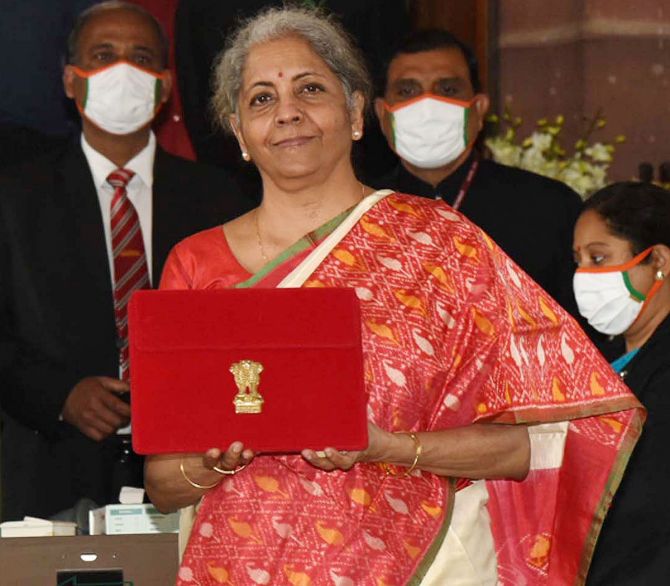'I would want people to have food on their tables and their wages to rise.'
'Will that happen or not is the question that we need to ask and answer.'

Former Union finance secretary Dr Arvind Mayaram tells Rediff.com's Prasanna D Zore that the Budget has failed to address the issues of job creation and bridging the income inequality gap.
As a former finance secretary, how do you look at the overall Budget proposals?
The broad thrust is a positive one with massive outlays for investments and infrastructure as well as healthcare, but the problem is going to be in finding the resources.
The numbers -- both non-tax and tax revenues -- are overstated.
We have not seen in the last four or five years, when the government saw the best of times, meeting its divestment targets. And (in) this year's (Budget 2021-2022) that has been a major chunk in there (the Budget proposes to raise Rs 1.75 lakh crore through divestments against Rs 2.14 lakh crore proposed in Union Budget 2020-2021). I don't think that target is achievable.
They are also banking a lot on monetisation of land banks (in possession of) of PSUs and (Indian) Railways and various Central Public Sector Enterprises (CPSEs).
Again, in the case of sale of land, especially in a period when the economy is suppressed, the prices (realised by the sale of land by the government) are going to be low.
It is also likely to raise issues of underpriced selling subsequently which can result, as and when the government changes, into investigations.
I think it would be extremely difficult for any decision-maker to be able to easily come to a conclusion that the land should be sold at a particular price.
So, that (budgetary proposal to raise resources) also is over-ambitious.
I do not think the buoyancy in taxes or the non-tax resources that they (the Budget) have shown to back their claim can be met. I have my doubts on those.
The third major problem is that -- despite the thrust on infrastructure and so on -- they have not really addressed the issue of job creation.
They may have said that investment in infrastructure will create jobs, but you must remember infrastructure investment does not happen tomorrow morning.
Even if you decide you are going to spend X amount of money in construction of roads, considering how long it takes to get through the tender process, the selection process, mobilisation time, etc, it will take anywhere between two to three years before the work even starts.
To that extent you are not going to see, in this year or the next year, any significant movement on creation of jobs.
Now during this period (of the COVID-19 pandemic) the major issue has been that not only have the jobs shrunk, but we have found, if you see the CMIE report, which clearly says that almost 40 per cent of those who were in salaried jobs before COVID are now reporting that they are self-employed and self-employed is not as in tech start-ups but basically living at subsistence level. These people are now engaged in activities like selling goods on the thelas (roadside stalls).
To that extent we are seeing that the issue of job creation or the issue of the informal sector worker has not been addressed (by the Union Budget 2021-2022).
According to some estimates, one out of five people who were employed in the non-formal sector before COVID have not found jobs, but at the same time if you see in NREGA, there is a 42 per cent cut in allocation.
Therefore the kind of backstopping that NREGA had done during the COVID is missing; whether it was the returning migrant labourers or with the people who had lost jobs or livelihood etc., NREGA had given them some sustenance.
I would have thought in this current year at least the allocation (towards NREGA) would have been stepped up to be able to shore up (incomes of) those people who are without jobs. Unfortunately, that has been cut by 40 or 42 per cent.
Then there is also the other issue of inequality.
During COVID, and it is now documented that the 1 per cent of the top earners of the economy have grown their wealth exponentially and made huge profits. But most others below their level, especially the poor, the highest loss of incomes have been seen among the (people with) lowest income brackets.
The World Bank data also shows that the gains that we had made between 2005 and 2015 when 270 million people, who had risen above the poverty line, were termed as 'vulnerable' during COVID.
This means that even one more single shock like COVID or demonetisation could send them hurtling back into poverty.
Now, we don't have any hard data at the moment, but very clearly an assumption can be made that significant number of people who had come out of poverty during the 2005-2015 period may have gone back into poverty and the finance minister has done nothing to bridge this inequality.
In fact, there is nothing (in the Budget) to say that they would have some form of mechanism for resource mobilisation from the top one per cent of individuals who have made huge amount of money and not necessarily through increase in income tax.
Resources could have been raised (from this one per cent ultra-rich people) via wealth tax, or tax on estate. There are several ways of mopping up resources to help alleviate the inequality.
One last thing I would like to mention here is whereas there has been a huge relief in terms of there being no COVID-tax, if you look closely at the agricultural infrastructure cess (Agriculture Infrastructure & Development Cess levied on petrol at Rs 2.5 per litre and Rs 4 per litre on diesel) which has been introduced on agriculture products will basically tax the farmer to finance agricultural infrastructure. So the cess is on apples, oranges, soyabean, and so on.
I think economy observers may have missed it, but to my mind this is an unfair cess because this is going to suppress the incomes of farmers.
As you can see clearly now, the Kharif incomes of the farmers are going to go down by at least 10 to 15 per cent over the last Kharif season.
I don't think anybody (in the government) has yet done a very fine analysis of where the pain points are in the economy to address them.
The question is who will be paying these cesses. Any indirect tax is regressive tax because it hurts the poor and rich alike.
When you impose cess on petrol the people who ride motorcycles also pay for it; when you impose cess on diesel then farmers who use tractors also pay for it.
Interestingly, there is no mention of cutting excise duty and petrol or diesel, but on the contrary there is a cess on it.
The cess on petroleum products is unfair to the states also because it, or any other cess for that matter, does not form part of that divisible pool (that is shared with the states) and so states don't benefit from it.
Whereas the state's capacity to raise resources is being crowded in by the central government through the cesses.
While the finance minister has been quite liberal with the fiscal deficit for 2020-2021, which has shot up from an estimated 3.5 per cent to actual 9.5 per cent, she has pegged it at 6.8 per cent of GDP for 2021-2022.
How do you think the finance minister will contain the fiscal deficit to achieve this target in the absence of any tax buoyancy?
Where will the money come from to bring the fiscal deficit from 9.5 per cent to 6.8 per cent?
What is the finance minister's calculation?
I have no idea especially because the GDP is barely going to grow this year (fiscal 2020-2021, which ends on March 31, 2021).
If you look at even growth projections then on a contraction of even 7.5 per cent -- which the Economic Survey is admitting, even though various economists are pegging it at 9 per cent or 10 per cent -- then the annual growth figure would actually end up at about 2.5 per cent or so for 2020-21.
So if the economy is only growing to going to grow about 2.5 per cent, then you are not actually looking at the headroom coming from the expansion of the economy.
My senses is the fiscal deficit number will go much beyond 9.5 per cent this year because I don't see any significant jump in tax and non-tax revenues.
In this scenario, achieving a fiscal deficit target of 6.5 per cent of the GDP for 2021-2022 also seems a bit over-ambitious.
Do you think the increased government capital spending from Rs 4.39 lakh crore to Rs 5.54 lakh crore can create productive assets to boost the economy and improve tax buoyancy?
If you are able to really raise that kind of resources where you actually spend that much money, then two-three years down the line, you will start seeing the impact and it will be a positive impact. That is the time lag between when you decide to invest and fruition of that investment.
Has the government made its intent very clear about privatisation of PSU banks and divestment of family silver?
In the Union Budget 2019-2020 they had decided to raise Rs 2.1 lakh crore through divestment when the stock market was booming yet they managed to raise only Rs 19,500 crore.
You are selling your equity because the stock market is booming. Most of these companies would be listed and therefore you can get good price for it. But they were able to get only Rs 19,500 crore.
Obviously, the gap between the stated target and what is achieved has been quite poor in the last few years. I mean you can see this year after year after year in the last six years.
But the stock market gave huge thumbs up to the Budget proposals?
That is because the stock market runs on sentiments. Now, two-three days down the line when people read the fine print, we don't know how the stock market will react.
The stock market is basically sentiment. Only top 30 to 50 companies are driving the stock market. Mid-sized and small-sized companies haven't been doing so well even in the stock market.
So if you have the Sensex which is composed of 30 companies, which are doing very well, it (the Sensex) is jumping.
That to my mind has no reflection on real economy. One can salute the Budget or not salute it at the end of the day, I would want (ordinary) people to have food on their tables and their wages to rise.
Will that happen or not is the question that we need to ask and answer.
How the stock market looks at it is really of no great relevance as far as the budget is concerned or its outcomes are concerned.
Won't a booming stock market help government meet its divestment targets?
Did it (help the government meet divestment targets) last year?
Photograph: Kind courtesy, PIB










 © 2025
© 2025